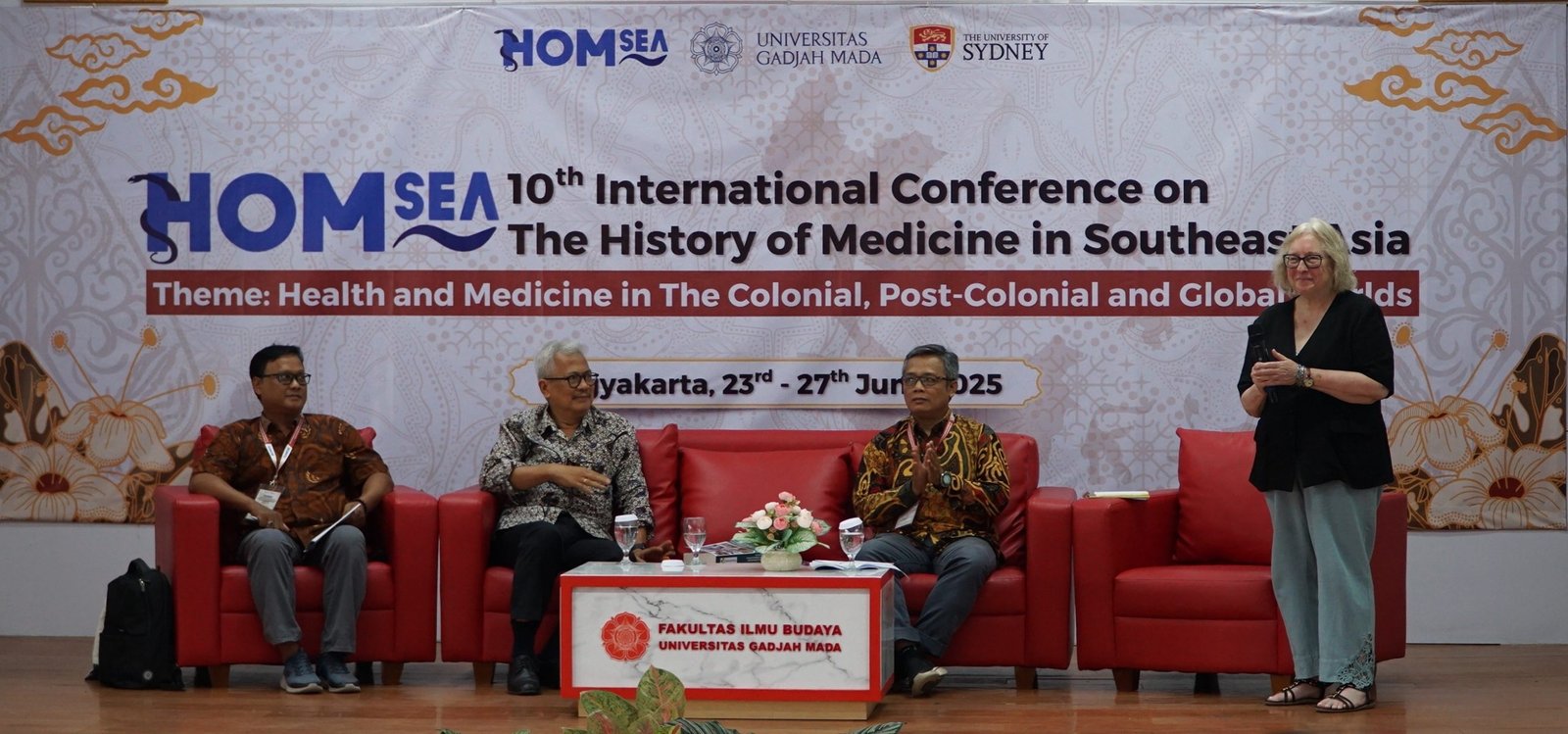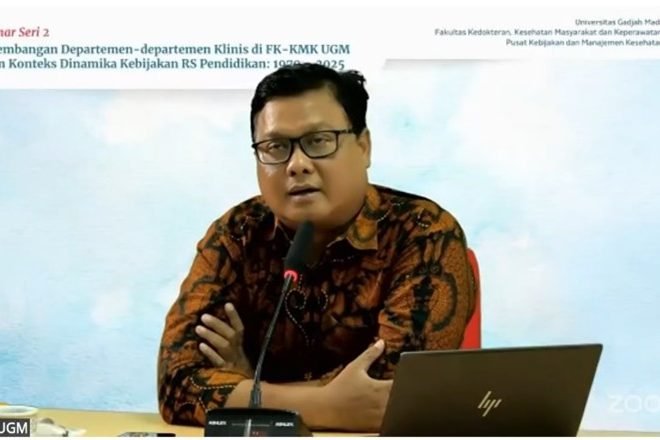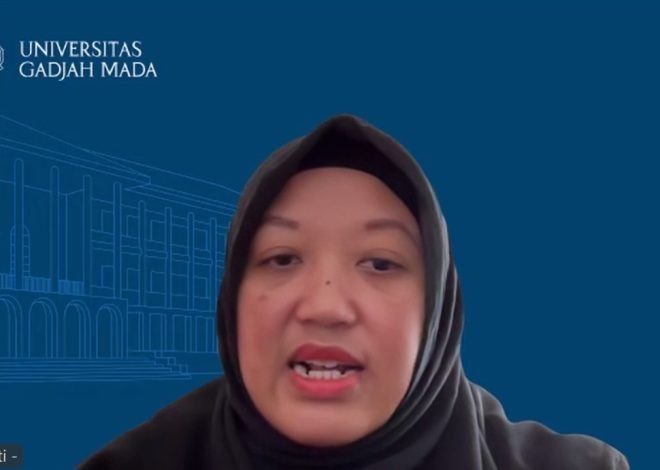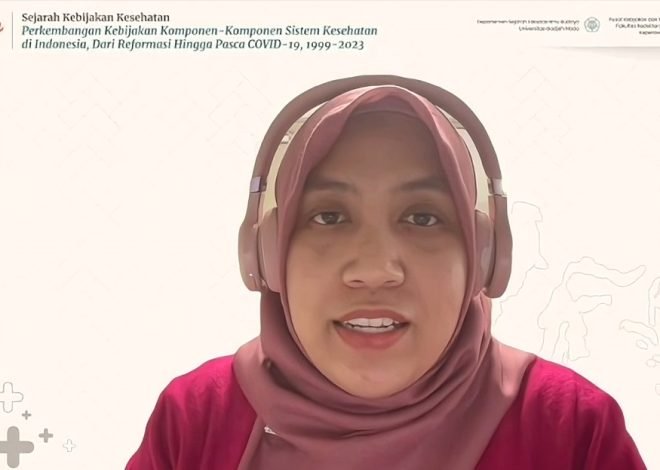HOMSEA
10TH INTERNATIONAL CONFERENCE ON THE HISTORY OF MEDICINE IN SOUTHEAST ASIA:
Health and Medicine in the Colonial, Post-Colonial and Global Worlds
23rd – 27th June 2025
Universitas Gadjah Mada Yogyakarta
UGM-Yogyakarta. As part of the 10th International Conference on the History of Medicine in Southeast Asia (HOMSEA), a thematic session titled “Health and Medicine in the Colonial, Post-Colonial and Global Worlds” was held on June 25, 2025, at the 7th floor of Soegondo Building, Faculty of Cultural Sciences, Universitas Gadjah Mada (UGM). The session featured an opening address by the Minister of Health of the Republic of Indonesia, Budi Gunadi Sadikin, who emphasized the importance of learning from historical developments in health policy. Prof. Laksono Trisnantoro, Professor at the Department of Health Policy and Management, Faculty of Medicine, Public Health and Nursing, UGM, served as the session discussant. The main presentations were delivered by Abdul Wahid and Bahauddin (historian from UGM), they both offered critical insights into the intersections of history, health systems, and governance. The session concluded with a symbolic handover of the book “Perkembangan Transformasi Kebijakan Kesehatan di Indonesia: Dari Reformasi Hingga Pasca Covid, 1999–2023,” marking an important contribution to the documentation of Indonesia’s health policy evolution in the post-reform and post-pandemic eras.
 In his opening remarks, Minister of Health Budi Gunadi Sadikin emphasized the importance of understanding the history of health policy in Indonesia, noting that historical reflection is essential for broadening perspectives, informing policy making, and avoiding past mistakes. He expressed his appreciation for the launch of the book “The Development of Health Policy Transformation in Indonesia: From Reform to Post-COVID, 1999–2023,” and hoped that it would enrich regional dialogue and serve as a meaningful reference for health systems across Southeast Asia.
In his opening remarks, Minister of Health Budi Gunadi Sadikin emphasized the importance of understanding the history of health policy in Indonesia, noting that historical reflection is essential for broadening perspectives, informing policy making, and avoiding past mistakes. He expressed his appreciation for the launch of the book “The Development of Health Policy Transformation in Indonesia: From Reform to Post-COVID, 1999–2023,” and hoped that it would enrich regional dialogue and serve as a meaningful reference for health systems across Southeast Asia.
Universitas Gadjah Mada (UGM), in collaboration with the Agency for Health Development Policy of the Indonesian Ministry of Health, held a presentation for the book “Perkembangan Transformasi Kebijakan Kesehatan di Indonesia: Dari Reformasi Hingga Pasca COVID-19, 1999–2023”. This book is the result of a multidisciplinary research effort involving experts in history, public health, government, economics, and law from UGM, with the support of the Ministry of Health. In this panel discussion, Dr. Abdul Wahid and Bahauddin explained about a small part of the book, namely governance and leadership. With the theme raised, that is “A Critical Evaluation on the Role of Government in the National Health Policy in Indonesia: From Reform to Post Covid-19 (1999-2023)”
 The book utilizes the World Health Organization’s Six Building Blocks of Health System as its analytical framework and divides Indonesia’s health policy evolution over the past 25 years into four major periods: the Reform and Decentralization Era (1999–2009), the National Health Insurance Era (2009–2019), the COVID-19 Pandemic (2020–2023), and the current Health System Transformation (2023–present).
The book utilizes the World Health Organization’s Six Building Blocks of Health System as its analytical framework and divides Indonesia’s health policy evolution over the past 25 years into four major periods: the Reform and Decentralization Era (1999–2009), the National Health Insurance Era (2009–2019), the COVID-19 Pandemic (2020–2023), and the current Health System Transformation (2023–present).
The transformation of Indonesia’s health policy landscape can be broadly divided into two key periods. The first, spanning from 1999 to 2009, followed the 1998 political reform and was marked by the enactment of Law Number 22 of 1999 on Regional Autonomy and Law Number 32 of 2004 on Regional Government. These laws transferred significant authority over health affairs to provincial and district governments, aiming to establish a more democratic and locally responsive health system. However, limitations in local leadership capacity and weaknesses in planning led to uneven health sector development across regions.
 The second period, from 2009 to 2019, ushered in the era of national health insurance with the passage of Law Number 36 of 2009, which affirmed health as a basic right for all citizens and mandated the implementation of universal health coverage through BPJS Kesehatan. Despite ongoing decentralization, coordination between national and local governments remained problematic, and BPJS implementation was hindered by administrative and communication barriers, resulting in persistent disparities in healthcare access.
The second period, from 2009 to 2019, ushered in the era of national health insurance with the passage of Law Number 36 of 2009, which affirmed health as a basic right for all citizens and mandated the implementation of universal health coverage through BPJS Kesehatan. Despite ongoing decentralization, coordination between national and local governments remained problematic, and BPJS implementation was hindered by administrative and communication barriers, resulting in persistent disparities in healthcare access.
The third period, spanning from 2020 to 2023, was defined by the COVID-19 pandemic, which posed a critical test to the resilience of Indonesia’s health system. In response, the government established a national task force under the National Disaster Management Agency (BNPB) to coordinate efforts, which included the mobilization of health workers, rapid vaccine procurement through Presidential Regulation No. 99/2020, and accelerated digitalization of the health information system. The success of the response was also supported by strong cross-sector and international collaboration, as well as grassroots volunteer movements. Building upon lessons from the pandemic, the fourth period, beginning in 2023, marked a significant shift toward systemic health reform. The enactment of Law Number 17 of 2023 and Government Regulation Number 28 of 2024 signaled a new era of governance, reinforcing the Ministry of Health’s authority in integrating services, human resources, technology, and financing. This phase places a stronger emphasis on evidence-based and research-driven policymaking to build a more resilient and future-ready health system.
 Dr. Abdul Wahid and Bahauddin closed this discussion session by concluding that Indonesia’s health policy journey over the past quarter-century reflects a dynamic interplay between decentralization, universal health coverage, crisis adaptation, and recentralization. The lessons from the COVID-19 pandemic have prompted a renewed focus on strong, centralized governance to ensure a robust and responsive health system for the future.
Dr. Abdul Wahid and Bahauddin closed this discussion session by concluding that Indonesia’s health policy journey over the past quarter-century reflects a dynamic interplay between decentralization, universal health coverage, crisis adaptation, and recentralization. The lessons from the COVID-19 pandemic have prompted a renewed focus on strong, centralized governance to ensure a robust and responsive health system for the future.
As the appointed discussant in the thematic session of HOMSEA 2025, Prof. Laksono offered a transdisciplinary reflection bridging history, health sciences, and public policy. He opened his remarks by referencing President Sukarno’s famous phrase “Jas Merah: Jangan sekali-kali meninggalkan sejarah”, a reminder of the enduring relevance of historical awareness in shaping the future of health systems. In his analysis, Prof. Laksono underscored the roles of various actors involved in this session: health system stakeholders, public policy makers, historians, and public health policy scientists. He described how each group not only influences or observes policy developments but also serves as a subject of historical inquiry. According to him, historians play a critical role by documenting and analyzing past decisions, while policy scientists conduct research that may inform both present governance and future historical narratives.
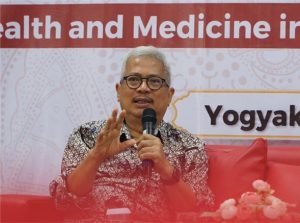 Prof. Laksono outlined the key chronological phases in the evolution of Indonesia’s health policy: from the colonial period, the Old Order (1945–1965), the New Order (1965–1999), the Reform era (1999–2010), the COVID-19 period (2020–2022), and the current transformation following the enactment of the Health Law (Law No. 17/2023). He noted that prior to the pandemic, reform efforts were often fragmented and decentralization was only partially realized, leading to weak coordination and uneven policy implementation across regions. This lack of systemic coherence, he argued, left Indonesia vulnerable during the COVID-19 crisis. However, Prof. Laksono emphasized that the pandemic acted as a critical turning point, what he called “history in the making” that prompted significant policy transformation. The 2023 Health Law, structured as an omnibus law, aimed to consolidate and harmonize fragmented health regulations, signaling a shift toward stronger central governance and evidence-based policy integration. He explained that current and future developments under this law will become subjects of historical analysis in the years to come, perhaps in 5, 10, or even 100 years.
Prof. Laksono outlined the key chronological phases in the evolution of Indonesia’s health policy: from the colonial period, the Old Order (1945–1965), the New Order (1965–1999), the Reform era (1999–2010), the COVID-19 period (2020–2022), and the current transformation following the enactment of the Health Law (Law No. 17/2023). He noted that prior to the pandemic, reform efforts were often fragmented and decentralization was only partially realized, leading to weak coordination and uneven policy implementation across regions. This lack of systemic coherence, he argued, left Indonesia vulnerable during the COVID-19 crisis. However, Prof. Laksono emphasized that the pandemic acted as a critical turning point, what he called “history in the making” that prompted significant policy transformation. The 2023 Health Law, structured as an omnibus law, aimed to consolidate and harmonize fragmented health regulations, signaling a shift toward stronger central governance and evidence-based policy integration. He explained that current and future developments under this law will become subjects of historical analysis in the years to come, perhaps in 5, 10, or even 100 years.
In closing, Prof. Laksono stressed the importance of history for all actors in the health system—whether they are policy makers, scientists, or implementers. He reminded the audience that their actions today will be remembered and evaluated by future historians, highlighting the value of reflexivity and accountability. Quoting again from “Jas Merah,” he encouraged participants to learn from the past in order to shape more thoughtful and resilient policies for the future.
After the panel presentation ended, the event also featured a symbolic book presentation from the PKMK FK-KMK UGM History Team and the FIB UGM History Department, represented by Prof. Laksono Trisnantoro, to Prof. Hans Pols, Ph.D., FAHA, FASSA, RSN, as President of HOMSEA. and Dr. Abdul Wahid also presented the book to Michele Thompson as the session moderator (keynote chair), and to Prof. Dra. Yayi Suryo Prabandari, MSi, PhD as Chair of the Local Organizing Committee of HOMSEA.
Readmore :
https://sejarahkesehatan.net/history-of-medicine-in-southeast-asia-homsea-conference/
Reporter:
Aulia Putri Hijriyah, S.Sej.,
Galen Sousan Amory, S.Sej

